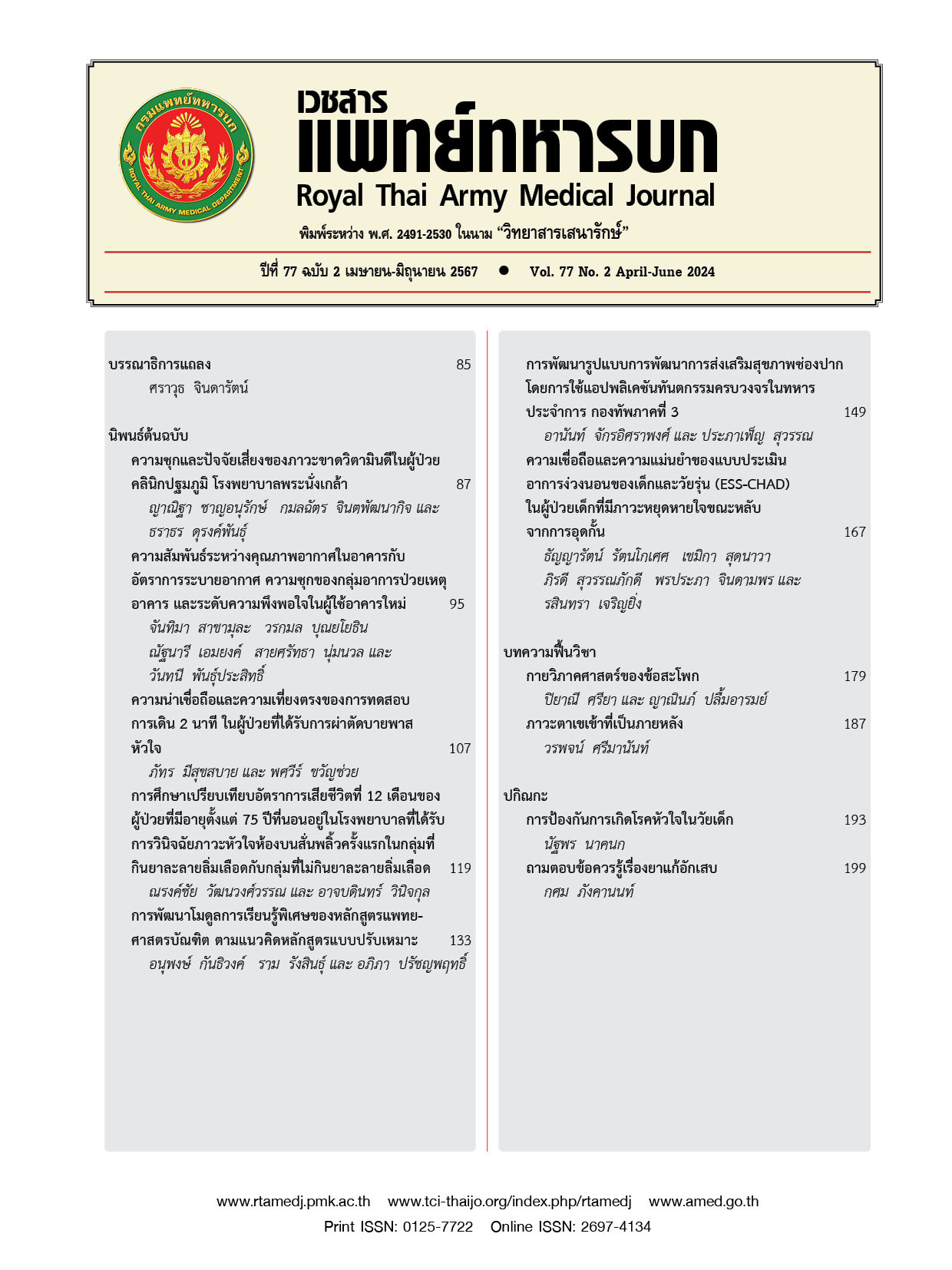การพัฒนาโมดูลการเรียนรู้พิเศษของหลักสูตรแพทยศาสตรบัณฑิต ตามแนวคิดหลักสูตรแบบปรับเหมาะ
Main Article Content
บทคัดย่อ
บทนำ โมดูลการเรียนรู้พิเศษของหลักสูตรแพทยศาสตรบัณฑิตเป็นการจัดการศึกษากลุ่มรายวิชาชีพแพทย์เพื่อพัฒนาทักษะการเรียนรู้ตามความสนใจและสมรรถนะของนักศึกษาแพทย์โดยปรับเหมาะการเรียนรู้ของตนเองอย่างเป็นระบบ จุดประสงค์การวิจัยในครั้งนี้ เพื่อวิเคราะห์ความคาดหวังต่อการจัดการศึกษาและพัฒนาโมดูลการเรียนรู้พิเศษสำหรับกลุ่มวิชาเฉพาะที่ส่งเสริมศักยภาพตามความสนใจของผู้เรียน วิธีการ งานวิจัยนี้ใช้แบบสอบถามเกี่ยวกับความคาดหวังของอาจารย์ผู้รับผิดชอบหลักสูตรและนักศึกษาแพทย์ต่อโมดูลการเรียนรู้พิเศษ เพื่อศึกษาระดับความสำคัญของโมดูลจำนวน 2 ด้าน องค์ประกอบและการปรับเหมาะของแต่ละโมดูล จากนั้นวิเคราะห์สถิติเชิงบรรยาย เพื่อพัฒนาโมดูลวิทยาศาสตร์การแพทย์พื้นฐาน โมดูลวิทยาศาสตร์การแพทย์คลินิก โมดูลเวชศาสตร์ชุมชน โมดูลเวชปฏิบัติคลินิกเฉพาะทาง และวิทยาศาสตร์ระบบสุขภาพ ผลการวิจัย ตัวอย่าง 69 คนที่ได้จากการสุ่มอย่างง่ายจาก 95 คน (ร้อยละ 72.63) แบ่งเป็นนักศึกษาแพทย์ชั้นปีที่ 6 จำนวน 38 คน และอาจารย์ผู้รับผิดชอบหลักสูตร 31 คน (ร้อยละ 55.07 และ 44.93 ตามลำดับ) สังกัดคณะแพทยศาสตร์ 19 จาก 22 สถาบัน จากการศึกษาความคาดหวังต่อโมดูลการเรียนรู้พิเศษ พบว่า ทั้งอาจารย์ผู้รับผิดชอบหลักสูตรและนักศึกษาแพทย์ ส่วนใหญ่ให้ความสำคัญกับโมดูลวิทยาศาสตร์การแพทย์คลินิกในระดับมากที่สุดทุกสถาบัน (ค่ามัธยฐาน = 5) ส่วนโมดูลอื่น ๆ จัดอยู่ในระดับความสำคัญมาก (ค่ามัธยฐาน = 4) ในทุกกลุ่มภูมิภาค แตกต่างจากคณะแพทยศาสตร์ในกรุงเทพมหานครที่ให้ ระดับความสำคัญของทุกโมดูลในระดับมากที่สุด ผลการวิเคราะห์เกี่ยวกับองค์ประกอบของโมดูล พบว่า โมดูลวิทยาศาสตร์การแพทย์คลินิก มีจำนวนหน่วยกิตสูงสุด (อย่างน้อย 15 หน่วยกิตในชั้นปีที่ 4-6) เมื่อเปรียบเทียบกับโมดูลเวชศาสตร์ชุมชน และโมดูลวิทยาศาสตร์ระบบสุขภาพ (14 และ 12 หน่วยกิตตลอดหลักสูตร) แตกต่างกับโมดูลวิทยาศาสตร์คลินิกเฉพาะทางที่จัดเฉพาะชั้นคลินิก (12 หน่วยกิต) และโมดูลวิทยาศาสตร์การแพทย์พื้นฐานในชั้นปรีคลินิก (10 หน่วยกิต) ทั้งนี้ มุ่งเน้นจัดการเรียนรู้แบบผสมผสานและบูรณาการกับหลักสูตรแกนกลาง (ร้อยละ 40.58 ถึง 56.52) ร่วมกับการปรับเหมาะโดยเสนอเนื้อหา และแนวทางการศึกษาตามศักยภาพของผู้เรียนภายใต้คำแนะนำจากอาจารย์ที่ปรึกษาอย่างต่อเนื่อง สรุป โมดูลการเรียนรู้พิเศษของกลุ่มวิชาเฉพาะที่ส่งเสริมศักยภาพตามความสนใจของผู้เรียนจะต้องจัดกลุ่มรายวิชาและองค์ประกอบของโมดูล เพื่อเพิ่มพูนทักษะทางวิชาชีพแพทย์ที่จำเป็นอย่างจำเพาะร่วมกับการปรับเหมาะที่ส่งเสริมให้นักศึกษาแพทย์คัดสรรกระบวนการเรียนรู้ได้ตรงกับความสนใจและสอดคล้องกับศักยภาพของตนเองอย่างเป็นระบบ
Downloads
Article Details

อนุญาตภายใต้เงื่อนไข Creative Commons Attribution-NonCommercial-NoDerivatives 4.0 International License.
บทความในวารสารนี้อยู่ภายใต้ลิขสิทธิ์ของ กรมแพทย์ทหารบก และเผยแพร่ภายใต้สัญญาอนุญาต Creative Commons Attribution-NonCommercial-NoDerivatives 4.0 International (CC BY-NC-ND 4.0)
ท่านสามารถอ่านและใช้งานเพื่อวัตถุประสงค์ทางการศึกษา และทางวิชาการ เช่น การสอน การวิจัย หรือการอ้างอิง โดยต้องให้เครดิตอย่างเหมาะสมแก่ผู้เขียนและวารสาร
ห้ามใช้หรือแก้ไขบทความโดยไม่ได้รับอนุญาต
ข้อความที่ปรากฏในบทความเป็นความคิดเห็นของผู้เขียนเท่านั้น
ผู้เขียนเป็นผู้รับผิดชอบต่อเนื้อหาและความถูกต้องของบทความของตนอย่างเต็มที่
การนำบทความไปเผยแพร่ซ้ำในรูปแบบสาธารณะอื่นใด ต้องได้รับอนุญาตจากวารสาร
เอกสารอ้างอิง
Quirk ME, Harden RM. Curriculum planning and development. In: Dent J, Harden R, Hunt D. London, UK: Elsevier. 2017 Apr 26:4-12.
Harden RM, Davis MH. AMEE Medical Education Guide No. 5. The core curriculum with options or special study modules. Medical Teacher. 1995;17(2):125-48.
Moon J. The module and programme development handbook: A practical guide to linking levels, outcomes and assessment criteria. London : Routledge; 2003.
Prachyapruit A. Development of teacher preparation model to serve education 4.0. Rompruek Journal Krirk University. 2017;35(3):102-36.
Frank JR, Snell L, Englander R, Holmboe ES, Icbme Collaborators. Implementing competency-based medical education: Moving forward. Medical Teacher. 2017;39(6):568-73.
Jason H, Westberg J. Preparing educators for adaptive education (AE) programs. Medical Teacher. 2018;40(8):828-33.
Fontaine G, Cossette S, Maheu-Cadotte MA, Mailhot T, Deschênes MF, Mathieu-Dupuis G, Côté J, Gagnon MP, Dubé V. Efficacy of adaptive e-learning for health professionals and students: a systematic review and meta-analysis. BMJ open. 2019;9(8):e025252.
Rahman SN, Alam NN, Alam T. Developing research knowledge through special study module: Notes from year 2 medical students [Online]. medRxiv. 2021: 6 p. [Cited 2024 Jun 20]. Available from : https://www.medrxiv.org/content/10.1101/2021.01.12.21249687v1.full.pdf+html
Quirk M, Chumley H. The adaptive medical curriculum: a model for continuous improvement. Medical Teacher. 2018;40(8):786-90.
Gossell-Williams M, Paul T. Introducing medical students to pharmacovigilance through a Basic Research Skills Special Study Module. Int J Risk Saf Med. 2020;31(2):81-7.
Jacobson L, Grant A, Hood K, Lewis W, Robling M, Prout H, Cunningham AM. A literature and medicine special study module run by academics in general practice: two evaluations and the lessons learnt. Medical Humanities. 2004;30(2):98-100.
Ghouse HP, Idris FI, Wint Z, Hasan T. A cross sectional survey of 3rd year undergraduate medical students’ perception of a ‘Community Oriented’multifaceted learning approach in the Special Studies Module SSM 3. The Asia Pacific Scholar. 2017;2(3):8.
Jha V, Duffy S, Murdoch-Eaton D. Development of transferable skills during short special study modules: students’ selfappraisal. Med Teach. 2002;24(2):202-4.
Howlin C, Lynch D. A framework for the delivery of personalized adaptive content. In : 2014 International Conference on Web and Open Access to Learning (ICWOAL) 2014 Nov 25 (pp. 1-5). IEEE.
Coiffier B, Shen PC, Lee EY, Kwong TS, Lai AY, Wong EM, Chiu KW, Vardhanabhuti V, Khong PL. Introducing point-of-care ultrasound through structured multifaceted ultrasound module in the undergraduate medical curriculum at the University of Hong Kong. Ultrasound. 2020 ;28(1):38-46.
Kiessling C, Müller T, Becker-Witt C, Begenau J, Prinz V, Schleiermacher S. A medical humanities special study module on principles of medical theory and practice at the Charité, Humboldt University, Berlin, Germany. Acad Med. 2003;78(10):1031-5.
Maxwell RS, Pounder DJ. The medicine and human rights special study module: a physicians for human rights (UK) initiative. Medical Teacher. 2009;21(3):294-8.
IBM SPSS Statistics for Windows, Version 28.0. Armonk, NY: IBM Corp.;2021.
Kaewyod T, Kanchanatawan B. Interests in medical specialties, personalities and correlated factors in choosing future training of sixth year medical students, Faculty of Medicine, Chulalongkorn University. Chulalongkorn Medical Journal. 2011;55(4):381-97.
Pitanupong J, Wongsuwan K. Factors for Choosing Residency Training Programs of Medical Students. Songklanagarind Medical Journal. 2017;35(3):263-72.
Rabintossaporn P, Ngamjariyawat A, Thuppia A, Sukprasert N, Saenthaweesuk S, Somparn N. Factors affecting the enrollment of elective prescribed course of third-and fifth-year medical students at the Faculty of Medicine, Thammasat University. Thammasat Medical Journal. 2019;19:S148-54.
Supawattanabodee B, Kluiprasert N. Need and reason of 6th Year Medical Students’ Selection of Residency Program. Vajira Medical Journal: Journal of Urban Medicine. 2019 31;63(5):349-56.
Chantharakhit C, Sujaritvanichpong N. Evaluation Factors may Affect The Goals of a doctor’s Life of Medical Students in Medical Education Center Buddhasothorn Hospital. The Journal of Prapokklao Hospital Clinical Medical Education Center. 2020;37(1):26-34.
Sripa P. Direction of Family Physicians towards Thai Health Care System. Journal of Health Science of Thailand. 2019;28(1):176-84.
Suvarnabhumi K, Wanichanon W, Pinsuwan T. Comparative Study on Satisfaction and Experiences of Medical Students Toward Family Medicine Outpatient Care at Clinics in Community and University Hospital. Songklanagarind Medical Journal. 2011;29(4):175-81.
Pokpermdee P. National Strategic Plan for Excellent Centers of Medical Service and Academic and Research in Thailand (5-10 years). Journal of Health Science of Thailand. 2020 ;29(6):1133-46.


